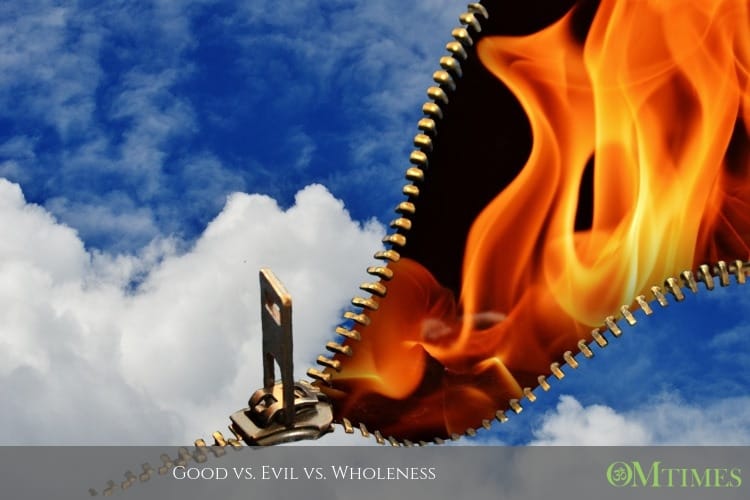Good vs. Evil vs. Wholeness

Few people are totally good or evil. Most are a blend of the two and it is in this that we can find wholeness.
The Spectrum of the Mind – Good vs. Evil vs. Wholeness
by Andrea Mathews
What is the playground of the mind? Where does it dally? What is the range of possibilities available to you within the scope of your mind? No, I’m not going to talk to you, yet again, about the Law of Attraction. I’m going to talk to you about the range of possibilities inherent within the Good/Evil spectrum.
You see, most of us grew up believing that there was a standardized definition of “good” and a standardized definition of “evil.” The spectrum actually ranges from “Holy” to “Evil” with “good” at close proximity along the spectrum to “Holy,” and “bad” at close proximity to “Evil.” That’s the range of possibilities available, then, to most of us in our minds. We believe in “good,” “bad,” “Holy,” and “Evil” more than we believe in almost anything else.
We came to this belief because our families of origin taught us that certain things were good, and others were bad or downright evil. It was possible for us to be good, bad or evil, but it was not possible, within this belief system, for us to be Holy—that was reserved for the divine. So most of us were taught to strive after being good so that we wouldn’t be bad or evil. And most of us have spent our lives trying to do that.
Of course, this also means that some of us will identify with the bad or evil side of the spectrum since it is one of the possibilities available to us. So, for example, a child who is chastised with severity or punished for the slightest infraction, never noticed any other time, might identify as bad or even evil. He believes since his parents mirrored only that, that these words define his character—and so he will do worse or evil to prove that he still exists at all.
You see, we depend on our identities to prove our existence to us. And we develop our identities within the family of origin early in life—some say between the ages of 0 and 7. It is during those ages that we are taught the distinctions between good and evil. So, within this very limited range of possibilities, we develop an identity. And that is the problem with the good/evil spectrum. It is limited to the range between man-made definitions of good and man-made definitions of bad or evil. None of these definitions can be standardized. What is good for one family, one culture, one group of people is bad to another.
We can see this right now in the division that exists between Democrats and Republicans—both of whom think that what they propose is good and right—even though their proposals are diametrically opposed.
Further, even the very idea that some things are good or bad can be disproven immediately. For example, we think that it is definitely bad to kill—except when we think that it is good to kill.
Yet many of us are stuck living only within the confines of these very limited, blurry and indefinable concepts ranging from good to evil. We believe that staying within those confines will somehow eventually turn them into worthy people. Thus, many of us spend our entire lives trying desperately to develop that distant and illusory sense of worthiness based upon finally arriving at something that can be defined as good enough to pass for worthy. In the meantime, we have not even begun to consider wholeness. So, a few questions to consider. What if worthiness cannot be measured by those indefinable concepts of good and evil? What if our worthiness is based, not in our identifications with good or evil, but in our very beingness? What if we are worthy because we exist?
Well, if that is true, then we can stop focusing so much on trying to prove our worth by being good and begin to trust our beingness to be enough to get us to right action. For example, we have been taught that guilt is a good guide. That it will get us to behave rightly—when actually, guilt is another form of anxiety that doesn’t do anything for us at all but worry us. Right action will come more from compassion and passion. Those are enough. And they come, not from some code about morality, but from the human heart. In other words, our beingness already has coded within its very essence, all that we need to live fully alive as whole people—people who actualize their beingness.
We can begin to actualize our beingness by bringing its gifts into conscious awareness and action. When we feel compassion, we can act on it. When we have deep soulful longings, we can act on them. When we have passion, we can act on it. When we find darker shadowy sides of ourselves, we can learn how to get close enough to them to see in the dark—to discover the gifts these shadows have come to bring us. This is wholeness—a unexamined concept. Let us begin to explore it.
You will also enjoy Is The Law Of Attraction Real?
About the Author
Andrea Mathews is a Psychotherapist, speaker, host of Authentic Living Radio show, and author of “Letting Go of Good: Dispel the Myth of Goodness to Find Your Genuine Self.” Inhabiting Heaven NOW: The Answer to Every Moral Dilemma Ever Posed,” “The Law Of Attraction: The Soul’s Answer To Why It Isn’t Working And How It Can,” and “Restoring My Soul: A Workbook For Finding And Living The Authentic Self.” www.andreamathews.com
OMTimes Magazine is one of the leading on-line content providers of positivity, wellness and personal empowerment. OMTimes Magazine - Co-Creating a More Conscious Reality




